COVER STORY SIDEBAR
Visionary building became a reality through the vision of its leading donors
Even for a major research university like Cornell, building and outfitting a cutting-edge research and educational facility like Weill Hall is extraordinarily, almost prohibitively, expensive.
But Weill Hall is here, and it is because Cornell had help -- lots of it -- from the state of New York and from individual philanthropists who backed the project with millions of dollars and their belief in its potential to generate breakthrough discoveries and economic benefit.
"Facilities of this type, because they are highly specialized and serve a broad community of investigators across a range of disciplines, require lead donors who are visionary and innovative in their thinking," said Stephen Kresovich, vice provost for the life sciences.
New York state was the first to stand behind Weill Hall with a $25 million commitment from its Gen*NY*Sis biotechnology economic development program. Joseph Bruno, former state senate majority leader, was a pivotal player in securing its approval, said Stephen Philip Johnson, vice president for government and community relations.
Public dollars helped to make the case for private support. As of today, a handful of lead donors have contributed nearly $75 million toward the building's $163 million cost, and many have made additional gifts toward professorships, scholarships and research fellowships:
|
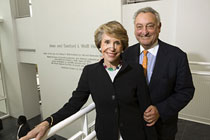
Joan and Sanford I. '55 Weill See larger image 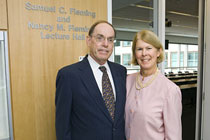
Samuel C. '62 and Nancy M. Fleming See larger image 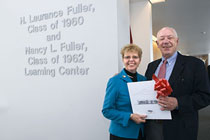
Nancy L. '62 and H. Laurance '60 Fuller See larger image 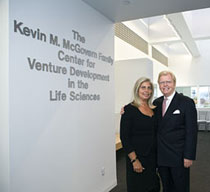
Lisa and Kevin M. '70 McGovern See larger image 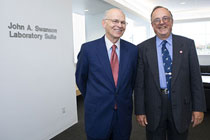
John A. Swanson '61 See larger image 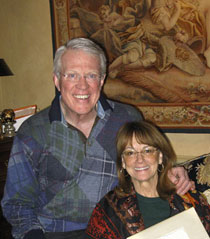
Philip M. '62 and Nancy H. '62 Young See larger image 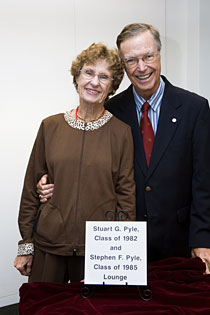
Jane W. '57 and David G. '56 Pyle See larger image |
Sanford I. '55 and Joan Weill extended their legacy among Cornell's most generous supporters in June 2007 with a historic commitment to the life sciences at Cornell's Ithaca campus and at Weill Cornell Medical College. In recognition, Weill Hall bears their name as does the Weill Institute for Cell and Molecular Biology, which is housed on parts of the second, third and fourth floors. "It's not just about money; it's about a passion and the brainpower to do something different," Sandy Weill said at the time of his gift announcement. "What we can do in medical research can make a difference in this world." The former chairman and CEO of Citigroup, Sandy Weill is a trustee emeritus, presidential councillor and chair of the Weill Cornell Medical College Board of Overseers.
Samuel C. '62 and Nancy M. Fleming provided one of the first private gifts to the building to name a lecture hall. They also endowed a professorship and three postdoctoral fellowships in the Weill Institute and a fellowship to support research between the Ithaca campus and Weill Cornell Medical College. Sam Fleming chairs Cornell's Life Sciences Advisory Board and is vice chair of the board of trustees.
H. Laurance '60 and Nancy L. '62 Fuller made a generous commitment in support of the two-story learning center that is the educational and outreach focal point of Weill Hall. Larry Fuller is a trustee emeritus, and Nancy Fuller served on the Cornell University Council for four years.
Kevin M. McGovern '70, his wife, Lisa, and their children, Jarrett '03 and Ashley '08, gave a substantial gift for the Kevin M. McGovern Family Center for Venture Development in the Life Sciences.
John A. Swanson '61 provided a gift to name the biomedical engineering north laboratory suite on Weill Hall's third floor. Swanson also has provided generous support for positions in the life sciences.
Philip M. '62 and Nancy H. '62 Young provided a gift to name the teleconference room in the Fuller Learning Center. Philip Young is a Cornell trustee.
David G. '56 and Jane W. '57 Pyle named the second-floor north break room in honor of their sons, Stuart G. Pyle '82 and Stephen F. Pyle '85.
All of these gifts have made Weill Hall a reality, but fundraising will continue not only for this facility but also in support of other life sciences priorities, especially graduate fellowships and endowed professorships, said Jim Mazza '88, director of Far Above … The Campaign for Cornell. Weill Hall has already become a focal point for attracting top scholars, as it will provide a crossroads for them to interact, challenge one another and generate awe-inspiring discoveries, Kresovich said. "The building is the keystone facility for the Life Sciences Initiative," he said. "Once you come into Weill Hall, you realize the promise of life sciences is not a distant reality. It is here, today."
|